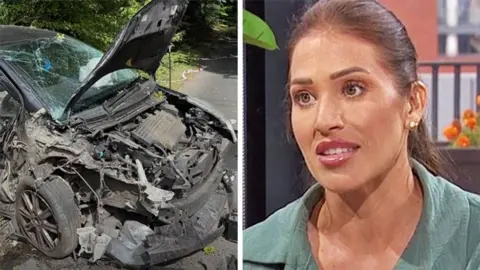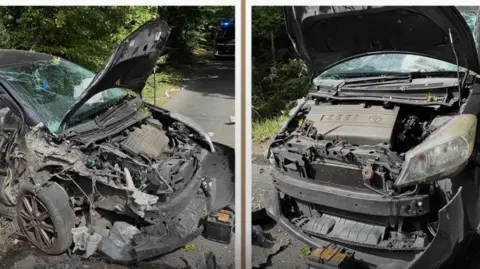Former detective recounts lessons after head‑on collision, highlights role of witnesses and health checks
Rebecca Mason, a former Surrey police detective and BBC Morning Live contributor, describes a recent head‑on crash and the practical and legal lessons she learned about post‑accident conduct and medical follow‑up.
Rebecca Mason, a former Surrey police detective who regularly appears on BBC's Morning Live, was involved in a head‑on collision this summer that left her with cuts and bruises and prompted reflections on safety, evidence and health after a crash.
Mason said the other driver, a woman in her early 70s, suffered a medical episode while driving and swerved into Mason's lane. "I just remember a huge bang and then everything felt like a blur," she told the BBC, describing how two bystanders worked to get her out of the car and she was taken to hospital for scans. She credited the witnesses at the scene with providing crucial information about what had happened.

Mason, who spent 14 years with Surrey Police and now advises on criminal matters for the BBC, said the experience changed her perspective from that of an investigator to that of someone directly affected by a crash. She emphasized the importance of witness accounts, saying: "without them, I wouldn't have understood what had actually happened." She also urged caution about what drivers say at the scene, noting the potential legal consequences of apologies or admissions of fault.
The account comes against a backdrop of frequent road collisions in the UK. Authorities report that more than 900 road traffic collisions occur daily on average, with emergency responders and medical services routinely called to assess and treat injuries. In Mason's case, hospital scans cleared her of major injury but documented her cuts and bruises, a typical course of care to rule out internal injury after significant impact.
Medical episodes behind the wheel, including sudden illness or loss of consciousness, can complicate fault determinations and raise separate public‑health and licensing issues for older drivers. Police and health officials typically investigate whether a medical event contributed to a collision and whether further medical assessment or driving restrictions are warranted.
Mason said the psychological impact of being involved in a serious crash was immediate and that practical steps taken by bystanders and emergency services were important both for physical safety and for understanding the sequence of events. She used her experience to underscore the value of high‑quality witness statements and prompt medical evaluation, both of which help protect health and clarify circumstances for insurers and investigators.
The collision illustrates the intersection of road safety, medical care and legal considerations that follow many crashes. Emergency scans and follow‑up medical care aim to identify injuries that may not be immediately apparent, while police inquiries and witness testimony inform decisions about liability and any necessary public‑safety measures.
Mason's experience is a reminder to drivers to seek medical attention after a collision, to cooperate with emergency responders, and to recognise the evidentiary value of bystanders. She said her professional background helped her process the incident, but added that being on the receiving end of a crash provided new insights into how quickly events unfold and how important immediate response and documentation can be for health and legal outcomes.
